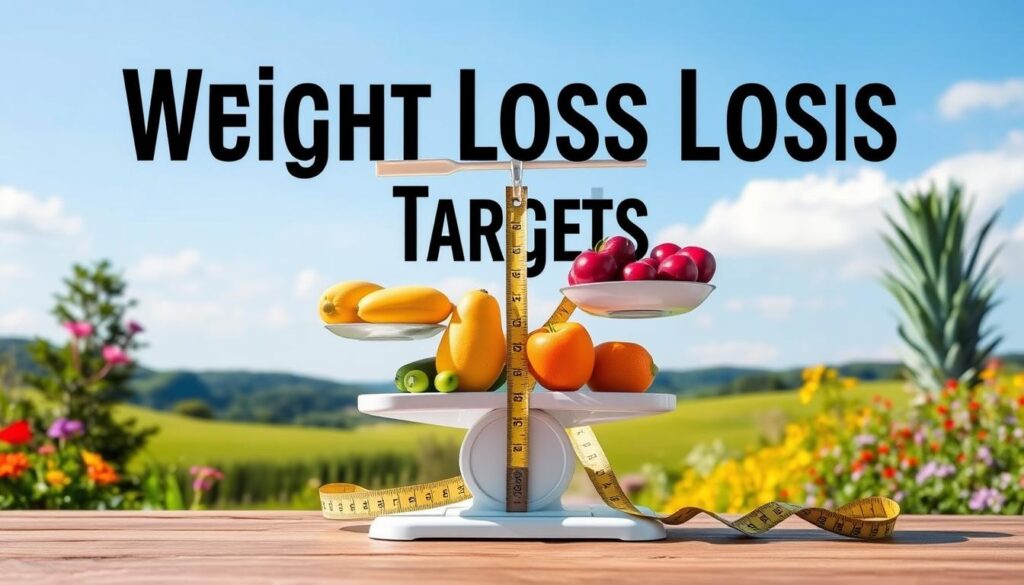Setting Achievable Realistic Fat Loss Goals
Losing just 3% to 5% of your body weight can bring health benefits. For example, if you weigh 200 pounds, losing 6 to 10 pounds can boost your health. It lowers your risk for diseases like type 2 diabetes. Setting realistic fat loss goals is key, not just for looks but for lasting lifestyle benefits.
The National Heart, Lung, and Blood Institute emphasizes the importance of realistic weight loss goals. They suggest losing 1 to 2 pounds per week for sustainable fat loss. With over 37 million people in the U.S. with diabetes, reaching these goals can mean a lot. It’s not just about personal success; it’s about creating a healthier society.
In this section, we talk about finding the right balance in your weight loss journey. Your goals should be realistic and keep you motivated. Let’s dive in!
Understanding the Importance of Goal Setting in Weight Loss
Effective weight loss goals are more than a random attempt. They provide a well-planned route to success. Setting these goals helps people stay driven and focused while losing weight. It’s proven that setting clear goals strengthens a person’s commitment to shedding pounds.
Research Supporting Goal Setting
Studies back the advantage of having specific goals. For example, a study in 2023 showed nearly 37,000 people. Those with higher ambitions kept up their weight loss better over 24 weeks. Goals based on health benefits lead to stronger weight loss commitments. Another research in the Journal of Human Nutrition and Dietetics found people with ambitious goals lost more weight permanently. This shows the power of clear goals.
Statistical Findings
Statistics show goal setting is key in weight loss plans. Aiming to lose 5% to 10% of your weight can greatly improve health. It benefits blood pressure and sugar levels.
A healthy weight loss rate is 1 to 2 pounds weekly. This fits with a sustainable calorie deficit plan. For example, eating 300 to 500 fewer calories daily is effective. Using nutrition apps can also aid in meeting weight loss goals.
Realistic Fat Loss Goals: Establishing Your Starting Point
Starting your fat loss journey means knowing where you are now. It’s key to set healthy weight loss goals that you can reach. Aiming to lose 5-10% of your current weight is a smart move.
For example, if you’re 200 pounds, losing 10 to 20 pounds is a solid base. This approach boosts motivation and avoids feeling overwhelmed.
Determining Your Ideal Target Weight
Your perfect weight should align with your goals and health needs. Consider your body composition, daily habits, and how much time you have. The need for a realistic starting point can’t be ignored. Knowing your current situation helps you plan a safe and successful fat loss journey.
Understanding Safe Weight Loss Rates
The CDC suggests that losing 1 to 2 pounds a week is safe. This pace encourages lasting habits and avoids quick-fix diets that fail. By setting doable goals, you can ease into new habits and build them for the future.
Remember, slow and steady wins the race. What’s important is building a plan you can stick with for life.

Creating Sustainable Fat Loss Milestones
Creating sustainable fat loss milestones breaks down your journey into easier steps. This makes sure your goals are both reachable and lasting. By monitoring progress and adjusting as needed, you boost your chances for success.
Methods to Track Progress Effectively
There are many ways to keep track of your weight loss:
- Mobile apps for logging meals and workouts.
- Fitness trackers to watch daily activity.
- Food journals to note what you eat.
- Before-and-after photos to see your changes.
Using these tools helps keep you accountable and gives deep insights. Studies show that tracking food can make you 50% more likely to succeed in losing weight. This is important for lasting weight loss.
Focusing on Behavioral Changes
Positive behavior changes are essential for lasting weight loss. Start by eating every 2-3 hours to boost your metabolism. Use smaller plates for portion control, reducing servings by 30%. Always stay hydrated, and make sure you get 7-9 hours of good sleep every night.
These habits make you feel fuller and healthier. If you face setbacks, keep a growth mindset. It helps you stay resilient. Combining effective tracking and focusing on these behaviors makes your weight loss journey smoother and more fulfilling.

Effective Strategies for Setting Achievable Weight Loss Expectations
Beginning your weight loss path can seem daunting. Yet, breaking it into small steps can change everything. By setting achievable weight loss goals, you create a clear path to success. This keeps you motivated and on track. Having clear, specific fat loss targets gives every step purpose and direction.
Developing Specific and Measurable Goals
Forget about vague wishes like “I want to lose weight.” Go for clear, measurable goals instead. A good goal might be, “I will walk for 30 minutes five times a week.” This makes your goal precise and actionable. It also makes tracking your progress easy, allowing for needed changes. While planning your weight loss strategies, aim for a healthy pace of losing 1 to 2 pounds every week. This means burning 500 to 750 calories more than what you eat. Keeping a diary can help you see what’s helping or hindering your progress.
Behavioral Action Goals vs. Outcome Goals
It’s vital to understand the difference between two types of goals. Outcome goals are about the final result, like losing a set amount of weight. Behavioral action goals focus on the journey, such as exercising often. To truly succeed, balance both types of goals. For example, you might aim to lose 9 pounds if your weight is currently 180 pounds. Your action goal could be to eat more vegetables and fruits for better health. This balanced approach keeps you motivated and moving towards your goals.

Staying Motivated on Your Fat Loss Journey
Starting your fat loss journey is like running a long race, not a quick dash. It’s key to stay motivated. It helps to keep thinking about why you want a healthier life. Make a colorful poster or a list of positive statements. Put them where you’ll see them every day. Getting your friends and family involved can also help a lot. They can cheer you on when things get tough.
Celebrating small wins is important too. Don’t just focus on the scale. A 1 to 2-pound loss each week is good and adds up. Maybe you fit into old jeans again or did an extra lap in your jog. Celebrate these steps. They boost your motivation and push you to keep going.
Being kind to yourself is crucial. Setbacks are not the end; they’re just part of the journey. Stay strong through tough times. Mindful practices, like a food journal, can keep you on track. Discussing your progress with others in weight loss groups can also help. This builds your dedication. Look at each day as a chance to improve and learn.
- Top Fat Loss Tools for Effective Weight Management - January 19, 2025
- Setting Achievable Realistic Fat Loss Goals - January 18, 2025
- Sustainable vs Quick Fix Fat Loss - January 17, 2025
